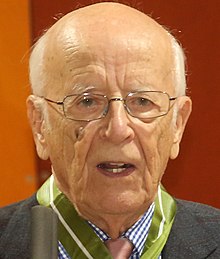| The Most ExcellentEmilio Lledó | |
|---|---|
 Lledó in 2008 Lledó in 2008 | |
| Born | Emilio Lledó Íñigo (1927-11-05) 5 November 1927 (age 97) Seville, Spain |
| Seat l of the Real Academia Española | |
| Incumbent | |
| Assumed office 27 November 1994 | |
| Preceded by | Joaquín Calvo Sotelo [es] |
Emilio Lledó Íñigo (Seville, 5 November 1927) is a Spanish philosopher. He has been a professor at several universities and is a member of the Royal Spanish Academy.
Career
He took his bachelor's degree at the Instituto de Bachillerato Cervantes and, in 1952, his degree in philosophy at the Complutense University of Madrid. He went to Germany to continue his studies in classical philosophy with Hans-Georg Gadamer, who helped him to finish his doctoral thesis by securing him a scholarship from the Alexander von Humboldt Foundation. In 1955, he obtained a position at the Complutense University of Madrid, but returned to Germany after his marriage in 1958 because Gadamer, who was then a Dean of the faculty at the University of Heidelberg, had offered him a position there.
In 1962, he again returned to Spain, taking a job as an instructor at the Instituto Núñez de Arce in Valladolid. After two years, he obtained a chair at the University of La Laguna. Shortly thereafter, in 1967, he moved to the University of Barcelona, where he had been given the chair in Philosophy. In 1978, he moved again, to the National University of Distance Education (UNED), where he remained until his retirement.
Lledó was elected to Seat l of the Real Academia Española on 11 November 1993, he took up his seat on 27 November 1994.
Philosophical thought
According to Lledó, the history of philosophy should be understood as a form of "collective memory", embracing mankind's total development, that can be structured through three main elements:
- Classical Greek philosophy, with special attention to the Platonic dialogues and Aristotelian ethics as well as Epicureanism.
- Attention to language as the principal object of philosophical analysis; which clearly converges in the development of the main currents of post-war European thought.
- Elaborating fully a consideration of temporality and writing that will lead to a "philosophy of memory" and a textual anthropology, from hermeneutic roots.
Selected works
- Filosofía y Lenguaje, Ariel (1970)
- La Memoria del Logos, Taurus (1984) ISBN 84-306-1250-5
- Memoria de la Ética, Taurus (1994) ISBN 84-306-0094-9
- El Silencio de la Escritura, Espasa (1998) ISBN 84-239-7439-1
- El Surco del Tiempo: Meditaciones Sobre el Mito Platónico de la Escritura y la Memoria, Crítica (2000) ISBN 84-8432-144-4
- Elogio de la infelicidad, Cuatro (2005) ISBN 84-934176-0-2
- Ser Quien Eres: Ensayos para una Educación Democrática , University of Zaragoza (2009) ISBN 84-92521-98-8
- Lenguaje e Historia, Dykinson (2011) ISBN 84-998221-0-X
- El Epicureísmo, Taurus (2011) ISBN 84-306-0869-9
- La Filosofía, Hoy, RBA (2012) ISBN 84-90064-20-2
- Los Libros y la Libertad, RBA (2013) ISBN 84-90065-68-3.
- Palabra y humanidad, KRK (2015).
- Pensar es conversar. Diálogo entre filósofos, with Manuel Cruz, RBA (2015).
- Fidelidad a Grecia, Cuatro (2015) ISBN 9788493856663.
Honors and awards
- Life member of the Institute for Advanced Study, Berlin (1988)
- Elected to the Royal Spanish Academy (1993)
- Menéndez Pelayo International Prize (2004)
- Order of Merit of the Federal Republic of Germany (2005)
- Lázaro Carreter Prize, from the Germán Sánchez Ruipérez Foundation (2007)
- Princess of Asturias Award (2015)
- A library has been named after him in Salteras, his parents' hometown.
Notes
- Elected on 11 November 1993
References
- Royal Spanish Academy: Emilio Lledó Archived February 28, 2015, at the Wayback Machine
- ^ Proyecto Filosofía: Biography
- "Emilio Lledó Íñigo". Real Academia Española. Archived from the original on 1 October 2015. Retrieved 27 March 2016.
Further reading
- Esteban Ortega, Joaquín. Emilio Lledó : Una Filosofía de la Memoria, San Esteban (1997) ISBN 84-8260-042-7
External links
- Fundación Juan March:Emilio Lledó en diálogo con Manuel Cruz
- CanalSur Andalucía: Emilio Lledó and Remedios Cervantes (1001 Noches)
- El País: Archive of articles by Emilio Lledó
| Real Academia Española seat l | |
|---|---|
| |
| He was elected in 1912 but never took the seat |
| Current members of the Real Academia Española | |
|---|---|
| |
| He/she was elected but is pending to take the seat |
- 21st-century Spanish philosophers
- 20th-century Spanish philosophers
- Heidelberg University alumni
- Members of the Royal Spanish Academy
- 1927 births
- Living people
- Recipients of the Order of Merit of the Federal Republic of Germany
- Academic staff of Heidelberg University
- Academic staff of the University of La Laguna
- Academic staff of the University of Barcelona
- Academic staff of the National University of Distance Education
- Academic staff of the Complutense University of Madrid